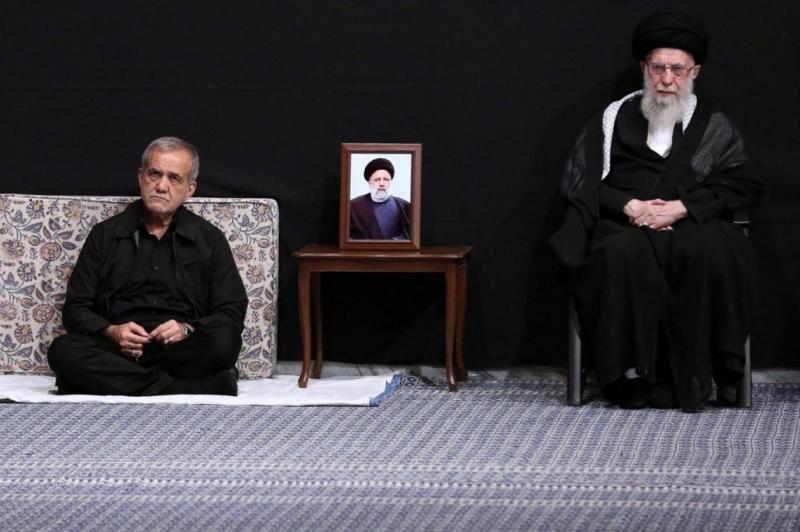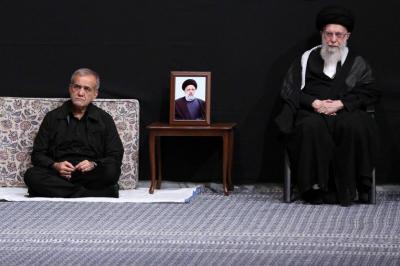Those who believe that elected Iranian President Masoud Beijakian will lead a new approach in governance and foreign relations that differs from the path set by the Supreme Leader and the clerics' regime are mistaken. While it is true that he is affiliated with the so-called reformist movement and won by a margin of three million votes over the fundamentalist candidate Saeed Jalili, this victory would not have occurred without Khamenei's initial consent to his candidacy for the "executive authority," which is the presidency itself, culminating in allowing him to win.
In his first press conference, which was postponed due to Khamenei summoning him for a "guidance" meeting, and later relocated to the Imam Khomeini shrine, Beijakian's most significant and alarming remark was, "If it weren't for Khamenei, my name would not have emerged from the ballot boxes." At the same conference, when he tried to reiterate his idea of "opening a new page," he was interrupted by the noise from the attendees, which was unclear if it was joy or protest, forcing him to abandon his prepared speech and merely distribute it while reminding that in the presence of Khomeini, he would be a "servant of the martyrs."
The promise of a new page has ceased to be useful after it has been utilized during the electoral campaign. The service to the martyrs with which he concluded his first press conference post-election pointed to a return to the roots that Khamenei had been keen to remind him of the day after. On that day, the Supreme Leader summoned the vice president and members of "Martyr Ibrahim Raisi's" government to tell them that Beijakian, the successor to Raisi, must adhere to Raisi's steps without ambiguity.
In Khamenei's eyes, Raisi was "popular," and everyone must follow his lead. His government was characterized as "the government of work, hope, and movement both at home and abroad," while he "avoided dual-edged talk or acting according to the tastes of others," and he "did not offer concessions uselessly." Khamenei recounted, "There was once a significant dispute in the country that nearly led to conflict, but I told him to show no reaction at all. It was difficult for him, but he did not react and endured it," and Raisi was indeed straightforward. Khamenei cited an example, "One time a journalist asked him if he maintains relations with that country? He replied no, and he adhered to this line until the end."
Khamenei's remarks regarding internal conflict and establishing relations with "that country" were not incidental. He directly meant Raisi's obedience regarding the "Hijab Uprising" and his support for Khamenei's stance on relations with the United States and the West. Khamenei was cautious on the eve of the elections about selecting someone who might seek to renew relations with America, and here he set the internal and external operational boundaries for the next president in his meeting with Raisi's government. Silence and acceptance domestically, and a clear "no" abroad.
To His Excellency President Beizakian, expectations should be lowered following the wave of talk about the victory of the "reformists." Many may not be concerned about the paths of conflict within Iran and its consequences, as this is primarily a matter for the Iranian peoples, but neighboring countries are interested in knowing what the new president can do regarding Iranian encroachment in their territories and societies. Here too, there should be no illusions, as Quds Force Commander Ismail Qaani was keen to visit the "resistance front areas" — the "official" name for Iranian dominance zones — after Beizakian's election, and he made sure to meet with the leadership of the axis of this front. That was a clear message from the "Export of Revolution" apparatus to the new president that the old faults remain intact, and diplomatic sweet-talk about consolidating good neighbor relations changes nothing.
In this regard, the Iranian mission to the United Nations fabricated an issue regarding the naming of the Arabian Gulf, insisting on calling it the Persian Gulf. This was a signal to the new president regarding the boundaries he cannot exceed, including the matter of names, which underlie Iran's stance on issues like the occupation of the UAE islands and the dispute over the shared oil field with Saudi Arabia and Kuwait.
The Gulf and Arab Mashreq will wait, wishing for a positive change in Iranian policies and the restoration of normal relations between the countries in the region; however, Beizakian's first announcements do not suggest a beneficial transformation. His exchanged messages with symbols of the Iranian axis and its militias in Lebanon, Palestine, Yemen, and Iraq confirm the continuation of the established path, which in simple assessments translates politically into the military directives of the Revolutionary Guard.
In his message to the world through the "Tehran Times," the elected president conveyed to the United States that "Iran does not respond to pressure" and reiterated what the regime says that "Iranian defense doctrine does not include nuclear weapons," while emphasizing friendly relations with China and a strategic alliance with Russia. Practically, he did not say anything new but renewed his commitment to Raisi's approach, which is what Khamenei demands.
On August 5th, or some say July 30th, Beijakian will be inaugurated. The Iranian official insistence is to complete the "democratic wedding" in a celebration attended by heads and leaders. Until that day, there will be repeated ceremonies of pledging allegiance to the regime while internal change promises are moderated. The notion that the state’s foreign policy is set by the National Security Council under Khamenei’s supervision will return. Based on that, Iran will not change, for the aforementioned council, which includes Jalili, Raisi’s rival, in addition to other fundamentalist figures, will not allow Beijakian, even if he wanted to, to reiterate his ally Javad Zarif's observations about security control over the state. Zarif himself, whose name was proposed for the foreign minister position, quickly denied his pursuit of the role, perhaps because he knows that such a step falls within the list of prohibitions. What is available will be nothing more than what we see today: a focus on secret communication with the U.S. to inherit its presence in West Asia and engage in battles to cement Iranian presence in the Arab Mashreq and the southern Arabian Peninsula.




